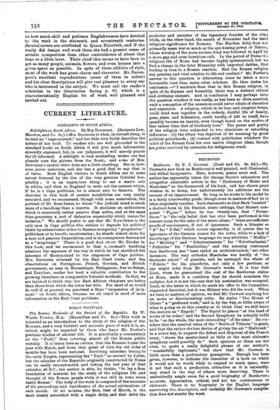ROMAN FESTIVALS.
The Roman Festivals of the Period of the Republic. By W. Warde Fowler, M.A. (Macmillan and Co. 6s.)--This work is intended as an introduction to the study of the religion of the Romans, and a very faithful and accurate piece of work it is, as, indeed, might be expected by those who know Mr. Fowler's previous studies of ancient life. It is practically a commentary on the " Fasti," thus covering almost all the Roman public worship. It is taken here as certain that the Romans began the year with March, and from that point of view the old order of months has here been restored. Surviving calendars belong to the early Empire, representing the " Fasti " as revised by Julius, but the calendar of the Republic originally constructed by Numa can be easily reconstructed, and taking the last year of that calendar, 46 B.C., the author is able, he thinks, "to lay a firm foundation of material for the study of the religious life and thought of the Roman people while it was still in some sense really Roman." The body of the work is composed of the accounts of the proceedings and significance of the actual celebrations of each month. Of all months, the first, that of March, is the most closely associated with a single deity, and that deity the . protector and ancestor of the legendary founder of the city; while, on the other hand, the month of November had the least religious significance for Romans. The Martian deity does not primarily mean war so much as the quickening power of Nature, whose worship of the more austere kind was followed in April by a more gay and even licentious cult. In the period of Numa religious life of Rome had become highly systematised, but we find a change in the later Monarchy with imported deities, that leading in turn to a Roman reaction. Had the Roman religion any genuine and vital relation to life and conduct ? Mr. Fowler's answer to this question is interesting, since he takes a more favourable view than many other scholars. He thus states his conclusion :—" I maintain then that in this Roman religion, in spite of its dryness and formality, there was a distinct ethical and civilising element. And in conclusion I may perhaps raise the question whether it was really, as has been so often asserted, such a conception of the unseen as could never admit of elevation and expansion. A religion, which in its best and simplest forms, could bind men together in the orderly, dutiful life of family, gens, ;state, and federation, could hardly, if left to itself, have speedily become an inanity, even though based on the motive of fear rather than that of brotherly love." The power and purity of the religion were subjected to two obnoxious or retarding influences : (1) the ritual was deprived of its meaning by great political priesthoods ; (2) contact with polytheism withdrew the mind of the Roman from his own native religious ideas, though his pietas survived by centuries his indigenous creed.


















































 Previous page
Previous page